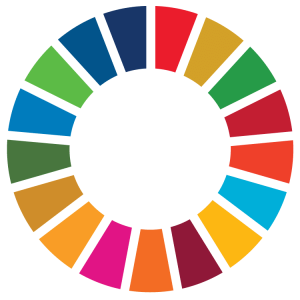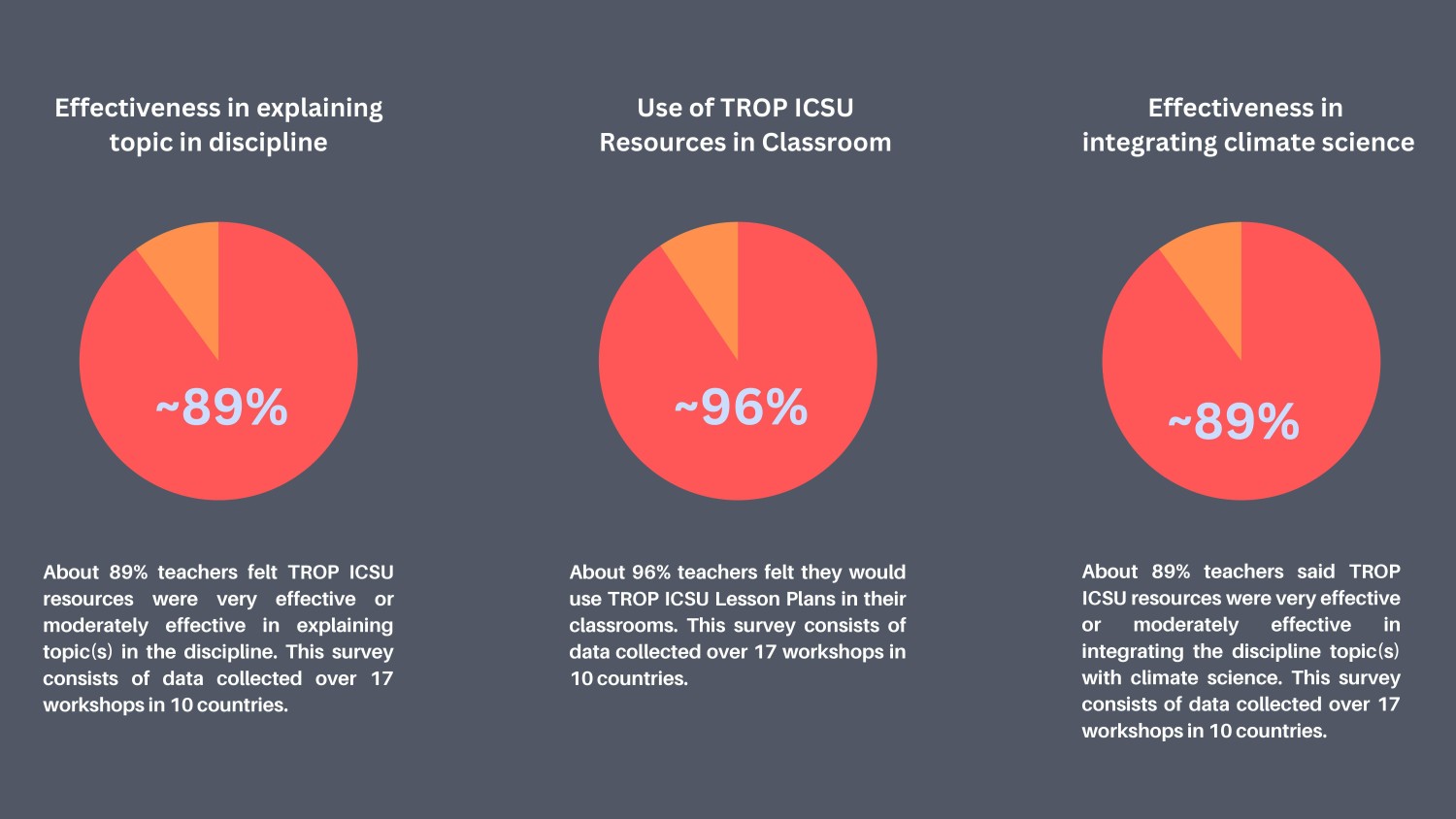The TROP ICSU project was initiated by the International Union of Biological Sciences (IUBS) as the lead partner with the International Science Council (ISC), and the International Union for Quaternary Research (INQUA) and 17 other partner organisations.
By the end of 2019, TROP ICSU had conducted 17 workshops for approximately 740 high school and undergraduate-level teachers in 10 countries across the globe and 4 workshops for approximately 54 climate experts.
The TROP ICSU project published over 530 Teaching Tools and 370 Lesson Plans across 10 disciplines. New additions include a Lesson Plan for every country in the world.
The TROP ICSU project was initiated by the International Union of Biological Sciences (IUBS) as the lead partner with the International Science Council (ISC), and the International Union for Quaternary Research (INQUA) and 17 other partner organisations.
A total of 150 Teaching Tools and over 70 Lesson Plans were published across 10 disciplines by the end of Phase 1 of the TROP ICSU Project.
By the end of 2019, TROP ICSU had conducted 17 workshops for approximately 740 high school and undergraduate-level teachers in 10 countries across the globe and 4 workshops for approximately 54 climate experts.
Along with 25 partner organisations the TROP ICSU project began its new phase with Centre for Sustainability, Environment, and Climate Change (CSECC), FLAME University as the implementation partner
The TROP ICSU project published over 530 Teaching Tools and 370 Lesson Plans across 10 disciplines. New additions include a Lesson Plan for every country in the world.
The TROP ICSU project was initiated by International Union of Biological Sciences (IUBS) and its implementation partner Indian Institute of Science Education and Research (IISER), Pune to enable current and future citizens to initiate positive action in mitigating the effects of and reversing climate change through pedagogical intervention.
To achieve the overall objective, we are –
The use of these teaching resources will enable educators to teach a topic in a particular discipline with the help of examples, case studies, and exercises related to climate change. These resources can be used globally by educators in the classroom/laboratory or by students for independent learning.
Such an integrated approach will help increase climate awareness among students.
Our aim is to ensure that these teaching resources

We aim to integrate relevant resources into the education system to help future citizens across the globe in improving their understanding of the science of climate change and in developing the necessary skills to mitigate its impact.

We collate and curate digital/ICT-based teaching resources that integrate climate studies across the curriculum of Science, Mathematics, Social Sciences and Humanities. These teaching resources are locally rooted in their context, but globally relevant for their science.

UNESCO mentions education as a key instrument to achieve the 17 Sustainable Development Goals (SGDs). TROP ICSU subscribes to this thought and aligns with the Action Plan of UNESCO to promote Education for Sustainable Development by aligning with the following Learning Objectives of ESD:
Ensure inclusive and equitable quality education and promote lifelong learning opportunities for all
Take urgent actions to combat climate change and its impact

































Identification of climate change-related resources as teaching tools or lesson plans from learning portals, education databases, and other sources.
• Mapping the resources to the most appropriate discipline-specific curricular topics
• Classification and categorization of resources based on where (classroom, laboratory, or field), how (individually or in groups, with or without supervision), for whom (school or undergraduate students), and by whom (teachers to teach or students as self-learning exercises) they can be used as teaching tools.
Internal review of the feasibility of usage of the identified climate change-related resource as a teaching tool, including examining copyright policies. The main criteria considered here are:
• Mapping the resources to the most appropriate discipline-specific curricular topics
• Classification and categorization of resources based on where (classroom, laboratory, or field), how (individually or in groups, with or without supervision), for whom (school or undergraduate students), and by whom (teachers to teach or students as self-learning exercises) they can be used as teaching tools.
Teaching Resource Development (Teaching Tools and Lesson Plans)
• Identify how the selected teaching tool could be used. The main criteria considered here are:
• Would the teaching tool being recommended here be attractive to the teaching community for use in the classroom? Will it help improve learning of discipline- specific topics and thereby be an incentive for teachers to use the suggested resource?
•Can the teaching tool being recommended here be used as a stand-alone teaching tool or does it need support from additional tools related to either climate-related topics and/or discipline-specific topics?
• While integrating a given resource, do we need to introduce the climate topic in the beginning of a lesson plan or somewhere in the middle or at the end?
• Does this tool introduce or discuss a location- or region-specific topic?
• Write a detailed, step-by-step guide for the teachers on how to use the teaching tool being recommended here. Clarity and simplicity are given maximum importance while writing these guidelines.
• Ensure seamless connectivity between the climate topic and corresponding curricular topic while preparing a detailed lesson plan.
Internal review of teaching resource for scientific accuracy and ease- of-use in the classroom
• This is being done by the project team based on their own knowledge and experience, with the help of information available on the Internet and in libraries, and by consulting appropriate experts (in science of climate change and in discipline- specific topics) locally and globally.
Publishing the teaching tools and lesson plans on TROP ICSU website for its global review.
External review of teaching tools for their scientific accuracy by Climate Science experts. The project team would then edit/modify the teaching tools and lesson plans as per the review and suggestions. Organization of workshops across the world for school and undergraduate teachers to review teaching tools and lesson plans for their use in regular teaching.
Organization of workshops across the world for school and undergraduate teachers to review teaching tools and lesson plans for their use in regular teaching.
Teachers would review the connectivity of the suggested climate change topics with their discipline-specific topics, feasibility of its use in their regular teaching, and the flow of the lesson plans. They would seek clarifications wherever needed and suggest changes to the teaching tools and step-by-step guidelines. The project team would then edit/modify the teaching tools and lesson plans as per the review and suggestions.
Formal publication of validated and peer-reviewed teaching tools and lesson plans on TROP ICSU website
Submission of new ideas for teaching resources: During the workshop for teachers and subsequently, we expect many teachers to submit their own ideas to integrate climate change topics with regular curricular topics and/or create their own detailed lesson plans as per their expertise/experience and local needs. Those teaching tools and lesson plans too would be further developed/modified and validated/reviewed as above.
Wider dissemination across the globe of the very idea of integrating climate change topics in the core curriculum across all disciplines and all levels of the education system, and the teaching tools and lesson plans being recommended here. We are supported by all our global partners in giving wide publicity to the teaching resources published on the TROP ICSU website and also in their implementation across the globe.
As a part of the effort in advancing science as a global public good, the International Science Council has identified four Domains of Impact which represent the landscape of challenges and opportunities. TROP ICSU aligns with the following Domains of Impact:
• Domain One: The 2030 Agenda for Sustainable Development
• Domain Two: The Digital Revolution
• Domain Three: Science in Policy and Public Discourse
Outreach and Engagement are considered as key components to the ISC’s Action Plan.
TROP ICSU maps its goals with the one of the goals by ISC, “Amplifying Impact through Outreach and Engagement”.

About 89% teachers said TROP ICSU resources were very effective or moderately effective in explaining topic(s) in the discipline. This survey consists of data collected over 17 workshops in 10 countries.

About 96% teachers said they would use TROP ICSU Lesson Plans in their classrooms. This survey consists of data collected over 17 workshops in 10 countries.

About 89% teachers said TROP ICSU resources were very effective or moderately effective in integrating the discipline topic(s) with climate science. This survey consists of data collected over 17 workshops in 10 countries.

The TROP ICSU (https://tropicsu.org) project aims to provide a suite of digital teaching resources that integrate climate studies with curriculum in various disciplines, including Science, Mathematics, Social Sciences, and Humanities.
These resources can be used by teachers at high school and undergraduate levels across the world to not only enhance the conceptual understanding of a topic in a discipline, but also improve awareness and understanding of climate change while helping students develop necessary skills for climate change adaptation and mitigation.
In order to read and understand the TROP ICSU Copyright Practice Standards and Policy-related Recommendations for TROP ICSU Users/Contributors please download the policy document.
The TROP ICSU project was founded by the International Council for Science (ICSU), led bythe International Union of Biological Sciences (IUBS), and co-led by the International Union for Quaternary Research (INQUA).
Total number of resources hit 650 count!

TROP ICSU moved to the ‘Future Ed Lab’ of Centre of Sustainability, Environment and Climate Change, FLAME University and was rebranded as ‘Climate Ed’.
The TROP ICSU project was initiated by International Union of Biological Sciences (IUBS) and its implementation partner Indian Institute of Science Education and Research (IISER), Pune to enable current and future citizens to initiate positive action in mitigating the effects of and reversing climate change through pedagogical intervention and science communication modules.
To achieve the overall objective, we are –
The use of these teaching resources will enable educators to teach a topic in a particular discipline with the help of examples, case studies, and exercises related to climate change. These resources can be used globally by educators in the classroom/laboratory or by students for independent
learning. Such an integrated approach will help increase climate awareness among students.
Our aim is to ensure that these teaching resources

We aim to integrate relevant education and science communication modules in the education system to help future citizens across the globe in improving their understanding of the science of climate change and in developing necessary skills to mitigate its impact.

We collate and curate digital/ICT-based teaching resources that integrate climate studies across the curriculum of Science, Mathematics, Social Sciences and Humanities. These teaching resources are locally rooted in their context, but globally relevant for their science.
All maps & pedagogical tools are owned by the corresponding creators, authors or organizations as listed on their websites. Please view the individual copyright and ownership details for each tool using the links provided. We do not claim ownership of or responsibility or liability for any of these tools. Images copyrights remain with the respective owners.
TROP ICSU is a project of the International Union of Biological Sciences and Centre for Sustainability, Environment and Climate Change, FLAME University.